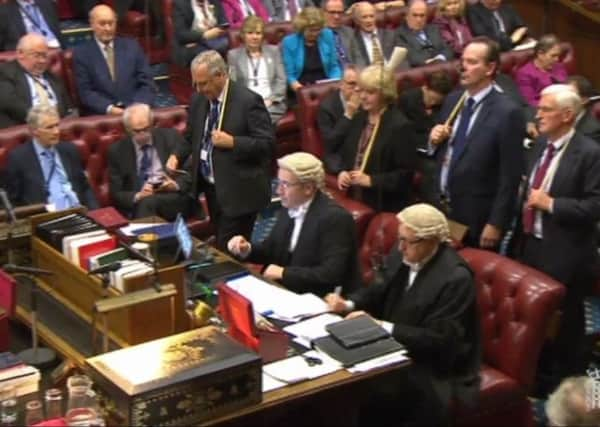Kenny MacAskill: Time to ditch the old, white, male Lords


That doesn’t mean that there isn’t a need for a revising chamber in our democratic structures to address legislation and consider wider proposals, as there most certainly is. It does though mean, that as constitutional debates trundle on about post-Brexit Britain and devolution, the issue of the House of Lords should not be forgotten.
The House of Lords is an utter anachronism, providing a sinecure for some and a safe bolthole for others. Of course, it does contain some outstanding talent and intellect but that’s lost in the sea of mediocrity that exists there as an accident of birth or through flagrant political patronage.
Advertisement
Hide AdAdvertisement
Hide AdChange there has to be, to provide not just for greater democracy but increased meritocracy.
That’s never easy in politics where vested interests can all too often play a part. However, this is the juncture at which to do it and to seek to provide a framework for improved governance that’s badly needed, as the body politic becomes increasingly held in disrepute.
It’s an institution that has been passed on down through the centuries and which, despite minor tinkering, retains most of its structural flaws – from an aristocracy rather than a meritocracy to a lack of democratic input that would reflect the changed society that the United Kingdom now is. It is not just gender where there’s a clear disparity but class, creed and race.
Of course, not everyone in the population can be properly reflected in a parliamentary chamber but some attempt at it should most certainly be made.
At the moment, it is overwhelmingly old, white and male. They may dominate, at least for a while, but should not do so to such a clear extent in a multicultural Britain.
The House of Lords should not be a club for those of privileged birth, often obtained through a doubtful historic right, or for politicians who are being put out to grass or provided with a nice little nest egg for their later years. Yet too many of the current membership fit that bill and too few the meritocracy that some thankfully do represent, through their contribution to our society and its economy.
A revising chamber and review body is a good idea in any democracy. The Scottish Parliament would benefit from such an institution though only if based on democratic principles. Legislation is hard not just for those debating it but for those drafting it. Greater opportunity to review new bills would be a help, not a hindrance.
Quirks and unintended consequences would be easier to address – they could never be entirely excluded, but that’s life. The debate on the right of the second chamber to reject or thwart new laws was settled in this country over a century ago. So it would be about enhancing, not undermining democracy.
Advertisement
Hide AdAdvertisement
Hide AdDown through the centuries, societies and nations have seen the benefit of such institutional procedures, checks and balances. From ancient classical times in Greece and Rome, through to the establishment of the United States of America, the debate has been ongoing with various different structures devised. Whatever issues I have with actions of the government of the USA, both now and in the past, I do see great merit in the separation of powers that they have sought to build in.
There are other simpler and less onerous structures. The Senate in the Republic of Ireland has served that country well, not simply in the actions they have taken to assist or modify what has been ongoing in the Dail.
It has also proved to be a route into politics for individuals of outstanding calibre, who have blessed the nation and in all likelihood would never have held office through normal political structures.
President Mary Robinson, perhaps the best example, was a Senate member based on her intellect and merit, not her party affiliation. She not only got to serve her nation but also appear on a world stage.
The Irish example shows that it’s not just about the vital but more mundane task of getting legislation right. It’s also about ensuring that our democracy has the best brains and talents available. Sadly, the House of Lords is currently failing not just because of the way people become members, but also through a caustic political culture. That, though, could be helped by change to the kind of second chamber used in Ireland.
Many, if not most, of the respected members of the House of Lords and those who have arguably made the greatest impact have been those there on the basis of their wider contribution to public life, rather than just political office held. They have added intellectual ballast as well as contributing sage advice. I’ve been fortunate to meet several and though most are crossbenchers espousing political neutrality, not all are.
Each country is unique in its needs and the structures required. What might benefit Holyrood is vastly different in scale and context to what might be needed to replace the House of Lords. The former could be enhanced by a forum of a very limited sort that reflected regional as well as other issues that apply in Scotland. Light touch and low cost, it could attract those who disdain party politics but have so much to offer. A replacement for the House of Lords is much more complex but needed even more.
There, it’s not so much about cost and the current incumbents “lording” it up. It’s about replacing the Lords with an institution rooted in this millennium, with some democratic basis not simple patronage and based on merit, not inheritance.